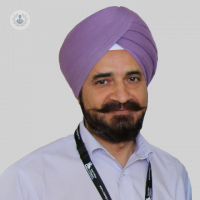Transanal Endoscopic Microsurgery (TEM)
Escrito por:In our latest interview, esteemed colorectal surgeon Mr Talvinder Gill explains what transanal endoscopic microsurgery is and when it is suitable. The Stockton-on-Tees-based surgeon details the benefits of this type of surgery, the possible side effects, and how long it takes to recover.

What is transanal endoscopic microsurgery?
Transanal endoscopic microsurgery (TEM) is an endoscopic operation that is performed through the anal canal. The patient is put under anaesthesia and a large scope is inserted into the back passage to allow the doctor to have a look. Under a magnified view, small instruments are used to perform the surgery, hence why it’s called microsurgery. It is mainly used to remove large polyps, particularly reoccurring polyps that have been removed endoscopically but have returned, or small cancerous tumours that are in the lower part of the bowel. Once the polyps or tumour has been removed, the bowel walls are stitched up.
It has been proven successful as surgery for the removal of benign tumours and reoccurring polyps, and it is starting to be used as a treatment for early cancers as well. In my hospital, I’ve carried out more than 100 procedures to remove early-stage cancerous tumours through the anal canal. When compared to traditional operations, that are “bigger” and can have more side effects and complications, TEM is quite a small operation, yet its success rate in the treatment of cancer in selected patients is as good as radical surgery. The most important factor is the selection of the right patient, ensuring they don’t have any prognostic criteria which could make them an unsuitable candidate. In the case of benign tumours or polyps, it is the most effective way to remove them.
When is transanal endoscopic microsurgery needed?
TEM is surgery that can be used for the removal of benign polyps, large polyps, reoccurring polyps, and early-stage cancer in the rectum. It is a highly-specialised procedure that is usually carried out in a tertiary referral centre by a colorectal surgeon. If an expert is able to perform TEM when treating large polyps in the rectum, it averts the need for radical surgery, which is a large surgery on the rectum often resulting in a temporary or permanent stoma. A TEM is always a better option, as nothing outside of the rectum is interfered with.
Reoccurring polyps that are difficult to be managed endoscopically, can be treated by the colorectal team, with TEM. TEM can only be used as a curative for cancer in the very early stages of tumour.
What are the side effects?
As the procedure is done under general anaesthetic, some of its side effects like a sore throat can be experienced by the patient until it wears off after a few hours.
People might experience bleeding afterwards, which is a risk associated with any operation or any procedure that removes a polyp. The risk of infection is small, but if it does occur it can result in bowel irregularity. For a few weeks, until it heals, the patient can have loose stools, mucus, and bleeding from the anus. It’s not common but if a large tumour is removed it can happen.
Initially, people feared that there would be a long-term effect on continence, due to the stretching of the anus by the insertion of a large scope. Follow up studies have shown no long-term effects on continence after TEM.
When compared to radical surgery, there are fewer side effects and complications. Radical surgery can result in a temporary or permanent stoma. In comparison, TEM is all done through the back passage and only has minor side effects.
How long does it take to recover from transanal endoscopic microsurgery?
Generally, TEM is a day surgery but the recovery time really depends on the extent of the surgery. Most patients go home on the same day or stay overnight. If the polyp being treated is smaller and benign, then the patient will recover quickly, in about two days. If it’s a bigger tumour, they might require four or five days to fully recover.
If you're interested in booking a consultation with Mr Talvinder Gill, you can do so directly by visiting his Top Doctors profile.



